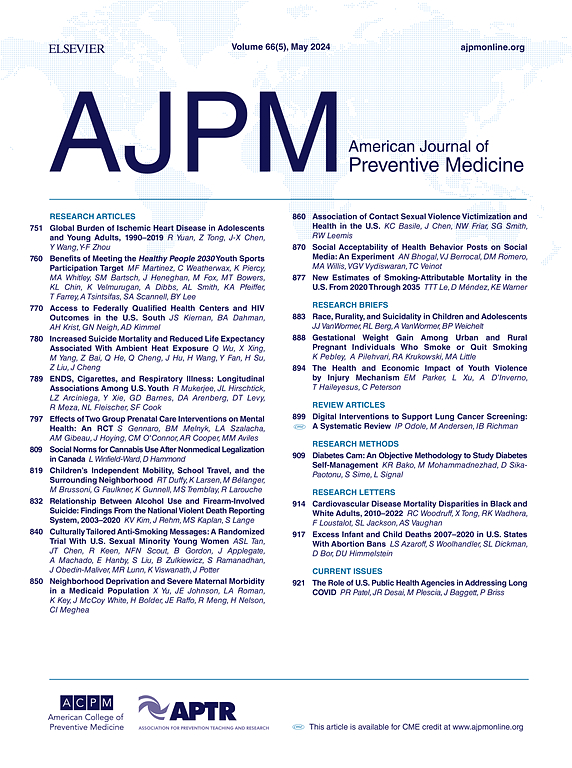多靶点粪便DNA和粪便免疫化学测试:测试性能的系统回顾和荟萃分析。
IF 4.3
2区 医学
Q1 MEDICINE, GENERAL & INTERNAL
引用次数: 0
摘要
导读:结直肠癌(CRC)仍然是美国癌症死亡的主要原因。自最新的USPSTF更新以来,已经发表了更多的研究来检查多靶点粪便DNA (mt-sDNA)和粪便免疫化学测试(FIT)的性能。该分析建立在USPSTF分析的基础上,包括最近对测试性能的研究。方法:以结肠镜检查为参考标准,检索2019年12月4日至2024年7月9日发表的PubMed和Embase论文。双盲审稿人筛选文章。主要结果是检测CRC、晚期肿瘤(AN)、晚期癌前病变(apl)和非晚期癌前病变(NAPLs)的敏感性和特异性。结果:在筛选的4320篇引文中,确定了41篇新研究。在结合先前USPSTF证据审查的14项研究后,分析了55项研究。41项研究报告了FIT单独的性能,10项研究报告了mt-sDNA单独的性能,4项研究报告了FIT和mt-sDNA。在14项评估mt-sDNA的研究中,两项研究认为下一代mt-sDNA检测的CRC敏感性为下一代mt-sDNA的93.6% (95% CI:89.0-97.1), FIT的71.6% (95% CI:64.3-77.9)。下一代mt-sDNA的特异性为91.6% (95% CI:89.2-93.7), FIT的特异性为96.3% (95% CI:95.4-97.0)。FIT的APL敏感性为22.2% (95% CI:20.6-24.0),下一代mt-sDNA的APL敏感性为45.6% (95% CI:40.8-50.4)。讨论:这项荟萃分析显示,mt-sDNA检测CRC的灵敏度很高,检测APL的灵敏度是FIT的两倍多。这些试验的终身效益和有效性有待进一步分析。本文章由计算机程序翻译,如有差异,请以英文原文为准。
Multi-Target Stool DNA and the Fecal Immunochemical Test: A Systematic Review and Meta-Analysis on Test Performances
Introduction
Colorectal cancer remains a leading cause of cancer death in the U.S. Since the latest U.S. Preventive Services Task Force update, additional studies examining the performance of the multi-target stool DNA and the fecal immunochemical test have been published. This analysis builds upon the U.S. Preventive Serices Task Force analysis by including recent studies on test performance.
Methods
PubMed and Embase were searched for manuscripts published between December 4, 2019, and July 9, 2024, using colonoscopy as the reference standard. Double-blinded reviewers screened articles. Primary outcomes were test sensitivity and specificity for colorectal cancer, advanced neoplasia, advanced precancerous lesions, and nonadvanced precancerous lesions.
Results
Of 4,320 citations screened, 41 new studies were identified. After combining with 14 studies from the previous U.S. Preventive Services Task Force evidence review, 55 studies were analyzed. Forty-one studies reported the performance of fecal immunochemical test alone, 10 of multi-target stool DNA alone, and 4 reported fecal immunochemical test and multi-target stool DNA. Of 14 studies evaluating multi-target stool DNA, 2 considered the next-generation multi-target stool DNA test’s colorectal cancer sensitivity was 93.6% (95% CI=89.0, 97.1) for next-generation multi-target stool DNA and 71.6% (95% CI=64.3, 77.9) for fecal immunochemical test. Specificity was 91.6% (95% CI=89.2, 93.7) for next-generation multi-target stool DNA and 96.3% (95% CI=95.4, 97.0) for fecal immunochemical test. Advanced precancerous lesion sensitivity was 22.2% (95% CI=20.6, 24.0) for fecal immunochemical test and 45.6% (95% CI=40.8, 50.4) for next-generation multi-target stool DNA.
Discussion
This meta-analysis revealed that multi-target stool DNA has high sensitivity for detecting colorectal cancer and is more than twice as sensitive than fecal immunochemical test for detecting advanced precancerous lesions. The lifetime benefit and effectiveness of these tests should be further analyzed.
求助全文
通过发布文献求助,成功后即可免费获取论文全文。
去求助
来源期刊

American Journal of Preventive Medicine
医学-公共卫生、环境卫生与职业卫生
CiteScore
8.60
自引率
1.80%
发文量
395
审稿时长
32 days
期刊介绍:
The American Journal of Preventive Medicine is the official journal of the American College of Preventive Medicine and the Association for Prevention Teaching and Research. It publishes articles in the areas of prevention research, teaching, practice and policy. Original research is published on interventions aimed at the prevention of chronic and acute disease and the promotion of individual and community health.
Of particular emphasis are papers that address the primary and secondary prevention of important clinical, behavioral and public health issues such as injury and violence, infectious disease, women''s health, smoking, sedentary behaviors and physical activity, nutrition, diabetes, obesity, and substance use disorders. Papers also address educational initiatives aimed at improving the ability of health professionals to provide effective clinical prevention and public health services. Papers on health services research pertinent to prevention and public health are also published. The journal also publishes official policy statements from the two co-sponsoring organizations, review articles, media reviews, and editorials. Finally, the journal periodically publishes supplements and special theme issues devoted to areas of current interest to the prevention community.
 求助内容:
求助内容: 应助结果提醒方式:
应助结果提醒方式:


